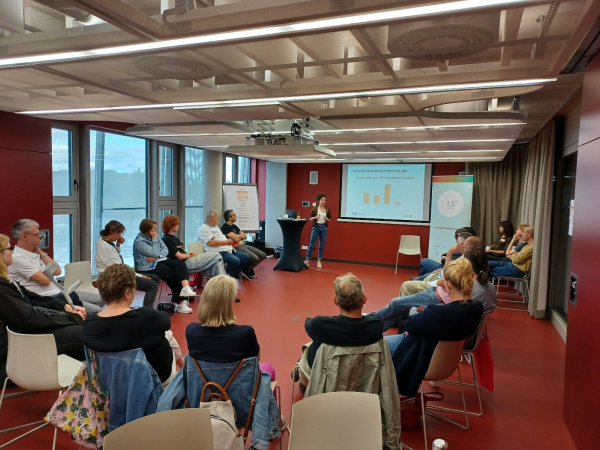
In order to help mitigate climate change and its associated consequences, a change in our everyday lives is imperative. But what might these changes look like in concrete terms, and what compromises are we willing to make? In our second round of citizen thinking labs, we engaged almost 100 people, across five European countries, with visions of a 2030 future. These visions involve profound lifestyle changes necessary to reduce personal carbon footprints to 2.5 tonnes of CO2e/year by 2030, aligning with the Paris climate goal. Examples include a 30% reduction in living space, an 80% decrease in consumption of animal-based products, and at least a 50% reduction in the number of kilometres flown per person per year.
Developed by those participating in our first citizens’ thinking lab last year, our vision of the future also includes so-called "conditions for acceptance" which outline the prerequisites necessary for individuals to make more ‘radical’ lifestyle changes. For instance, acceptance of a primarily plant-based diet hinged on individuals being better informed about the possibilities of maintaining a balanced and healthy diet without consuming animal-based milk, meat, and cheese. As another example, forgoing private car use necessitated the presence of a safe, reliable, and affordable public transport system. These, alongside the “conditions” necessary for other lifestyle changes were integrated into the workshop ‘vision of the future’. While for some citizens envisioning this future and the lifestyle changes required as a prospective reality seemed almost impossible, others found it relatively easy to imagine and deduce potential challenges or opportunities which might arise with regards to their current everyday lives.
The 1.5° world was often associated with positive outcomes like improved health and a stronger sense of community. However, citizens also recognised that turning these future visions into reality might entail a reduced quality of life, for example due to uncomfortable living situations or limits on personal freedom, acknowledging a potential "price" to pay for compromises made. Overall, citizens exhibited more enthusiasm for changes in nutrition and mobility compared to lifestyle adjustments in housing and leisure. While they were interested in new mobility options and improvements to health associated with increased physical activity and reduced consumption of animal-based products, potential conflicts were identified in scenarios like living in larger communities, house sharing, or foregoing use of their private cars for leisure and hobbies. Consequently, citizens were asked to engage in small group discussions to explore how identified problems and conflicts in this 1.5° future could be addressed, either individually or on a structural level. This collaborative effort led to the development of initial ideas for solutions. While some solutions proposed by citizens align with ongoing debates and media coverage in (some of) our case countries, there were a number of innovative ideas for structural changes, such as:
- Encouraging shared spaces: Participants suggested incentivising shared housing and kitchens to reduce the number of square meters per person. They proposed providing subsidies for landlords responsible for maintaining shared spaces, ensuring their upkeep.
- Reducing Car Mileage: To minimise people’s car mileage for leisure, hobbies, and shopping, citizens recommended offering free bike tickets on trains and establishing a centrally organised delivery service for groceries in rural areas, catering for entire streets and/or villages.
- Reduced consumption of animal-based products: Participants voted for local actors to distribute vegetable seeds for free and rent out small areas of agricultural land to private individuals, allowing them to more easily cultivate their own vegetables and reduce their consumption of animal-based products.
On a personal level, citizens suggested:
- Reassessing Travel Routines: Participants proposed to minimise long distance journeys to once every two years and to stay in travel destinations for extended periods in order to decrease the frequency of air travel.
- Traditional changes: Citizens also proposed to normalise and celebrate a vegetarian Christmas for example, fostering the gradual adoption of a new tradition that would help to reduce the consumption of animal-based products.
- Redistributing care work and creating social relationships: Advocating for people in the same community to look after each other and build relationships, even if they are not related, thereby reducing the need for car travel to visit distant relatives.
While these examples have an anecdotal character, our ongoing process involves analysing the entirety of conflicts and proposed solutions as part of this project’s broader aim to incorporate these insights into a set of policy recommendations which will be further developed over the coming months.
Lena Domröse & Maren Tornow (adelphi)

